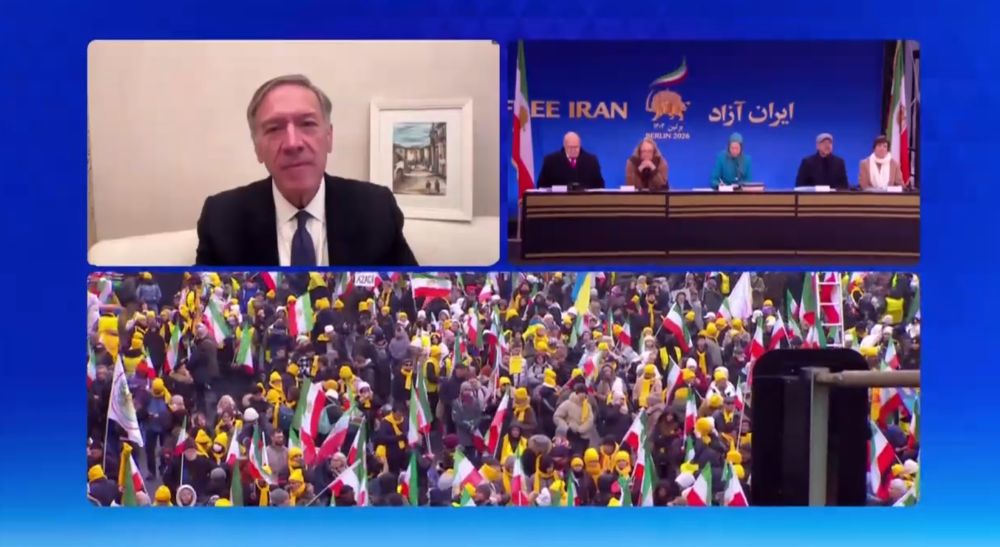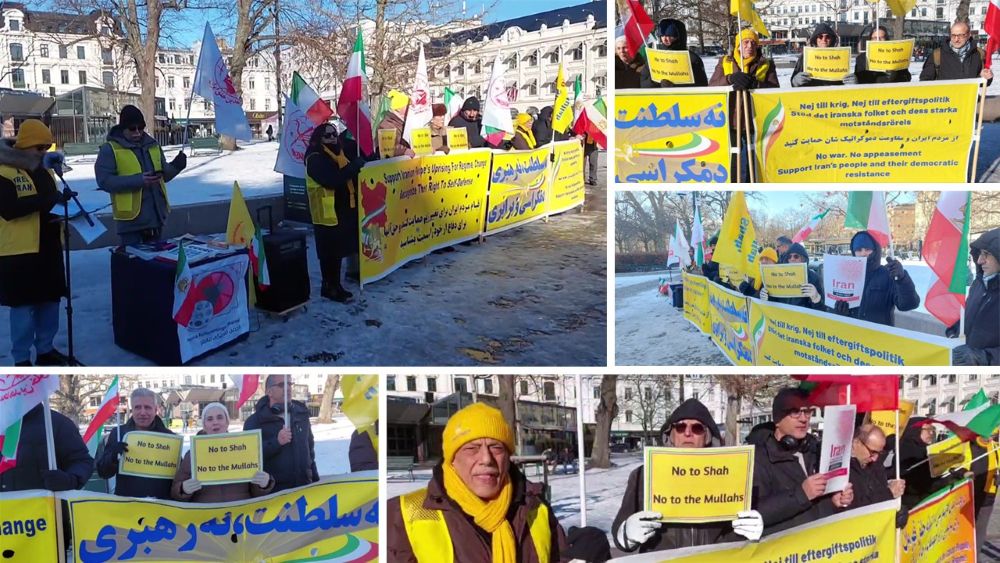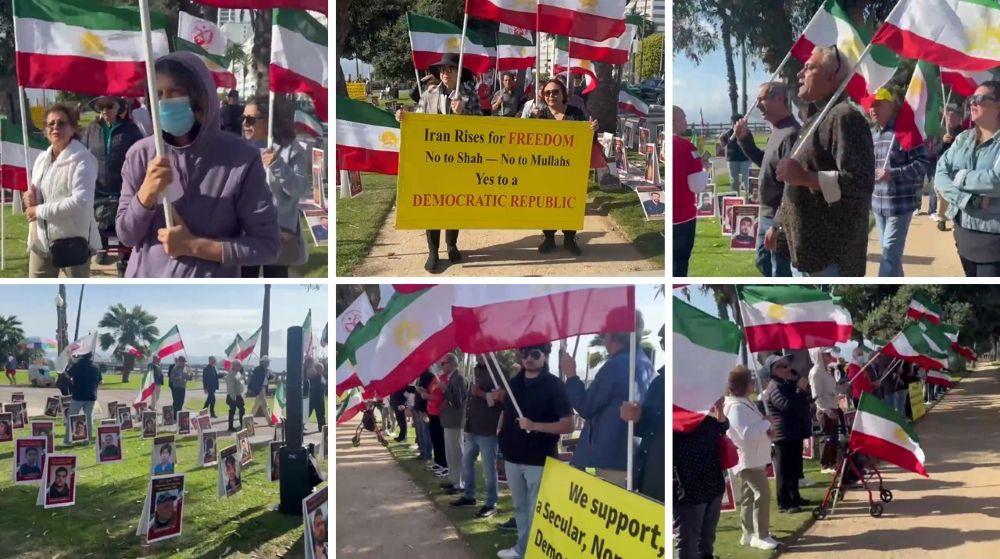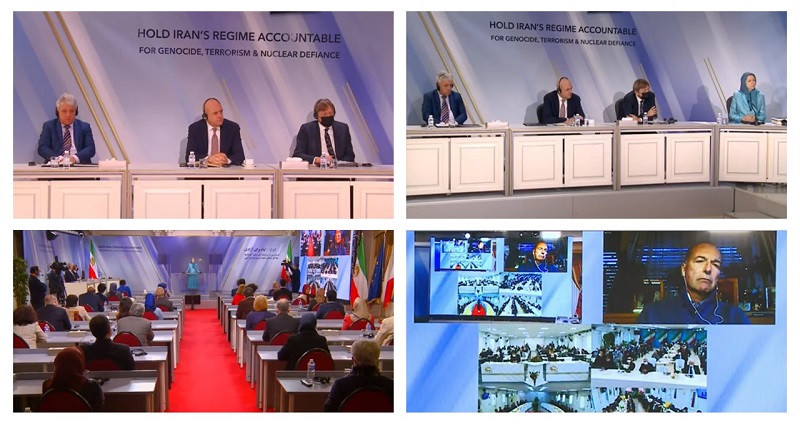
The National Council of Resistance of Iran (NCRI) hold a conference in France, Auvers-sur-Oise, entitled, “Holding the Mullahs’ Regime Accountable for Genocide, Terrorism, and Nuclear Defiance.”
Several International dignitaries, former European officials, deliver speeches in the conference.
The keynote speaker at the conference is Mrs. Maryam Rajavi, President-elect of the National Council of Resistance of Iran (NCRI).
The following will be updated at this conference:
Mrs. Maryam Rajavi The President-elect of the National Council of Resistance of Iran (NCRI)
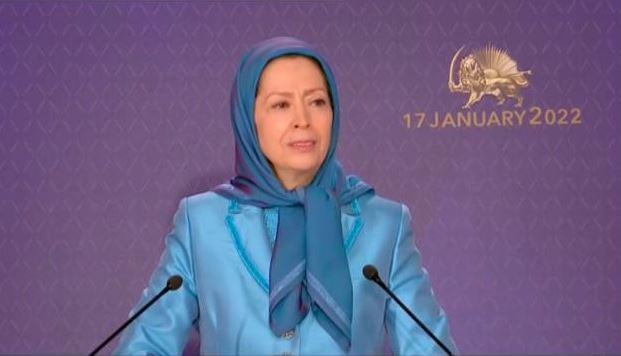
Why do the ruling mullahs respond to the West’s restraint by inciting wars? Why have they expedited their efforts to acquire a nuclear bomb? What provokes their belligerence?
Why does Khamenei pursue policies that ostensibly seem to be to be harmful to the regime?
The answer to all these questions is that the clerical regime is in a state of being overthrown. Yes, Khamenei takes less risks to avoid the great danger of overthrow.
The regime is brazenly refusing to invest in improving the Iranian people’s livelihood, welfare, health, education, employment and housing. This situation further intensifies public discontent. Khamenei, however, prefers to reinforce his police-military machine because the regime is in the state of being overthrown.
As a result, we see that from water, bread, and utilities, to housing and wages, yes, everything fuels public discontent.
There is an openly hostile relation between the ruling regime and our people. The existence of an organized and widespread resistance against the regime attests to this truth.
The mullahs’ approach to society, the economy, vital resources, the environment, the youth, women, and Iran’s ethnic groups are far worse and more alien than an occupying power.
In today’s Iran, the regime treats our people with repression, bloodshed and slaughter. The people have responded with rebellion and uprising.
The regime being in the state of overthrow can be best seen in successive uprisings by various sectors of Iranian society. The continuation of these uprisings indicates the vast buildup of unresolved political, social, and economic problems and our society’s urgent desire for fundamental change.
The continuation of these uprisings also speaks to the regime’s inability to tackle society’s difficulties, and, consequently, it has no solution to contain the uprisings, but through crackdown. Through obtaining nuclear weapons, the regime is seeking to find a way out of these crises.
Of course, the bomb is not for confronting the uprisings but to blackmail Western governments. It is vital for the clerical regime to elicit more concessions from the West. That is why the mullahs have given priority to obtaining nuclear weapons as opposed to other options. For this reason, they have practically accepted the collapse of the JCPOA.
If you ask the mullahs whether they want the lifting of sanctions or a bomb, their answer so far is both. In the absence of a firm policy, they undercut the effectiveness of sanctions and drag out the talks to buy time for the bomb.
This situation has put the world, especially Western governments, to the test.
Western governments have long paid the price of appeasing the religious fascism from the pockets of the Iranian people.
But now, beyond the interests of the people of Iran and the Middle East, the security and vital interests of Western countries and societies are at stake.
Do Western governments want religious fascism and the central banker of terrorism to arm itself with nuclear weapons?
The Iranian people and their aspirations have been ignored for years, whereas today, the Iranian people are the most serious player who determine Iran’s future.
We say, there is need for a correct and responsible policy, which is to exert decisiveness against the regime and stand with the Iranian people.
In step with the expansion of the protest movement, our Resistance has been able to establish an organized network of Resistance Units in provinces throughout the country. Through daily activities against repression, this network sets the ground for subsequent uprisings.
The Resistance Units’ activities show the way and advance the people’s uprisings and the protest movement forward towards the regime’s overthrow.
With its deep roots and substantial support in society, the Iranian Resistance relies on the movement of rebellious and combatant youths in most of the provinces, to prepare for a moment that would bring the regime’s overthrow.
All indications are moving towards this moment and the regime cannot escape it. In addition to the selflessness of its women and men, and the organization and cohesion of its ranks, the Iranian Resistance represents a free, prosperous, and democratic future for Iran.
Today, many have realized that the fight against extremism under the banner of Islam, more than anything else, requires the Muslims themselves to play their role.
As a result, the existence of an alternative is of crucial importance. But such an alternative is not just a theoretical solution.
Rather, it must rely on a movement that has risen up against the fountainhead of fundamentalism, paid the price of its struggle, and enjoys the capacity to bring about change in society.
With these attributes, especially enjoying sufficient popular support, and the competence to bring about democratic change in Iran, the Iranian Resistance has been able to defeat fundamentalism inside Iran, intellectually and ideologically, and expose it on the regional level.
First, the regime’s nuclear projects are entirely against the national interests of the Iranian people. Negotiating with a regime that does not adhere to any rule or law only gives it time.
The international community must reinstate the six UN Security Council resolutions on the Iranian regime’s nuclear projects.
It should bring the regime’s uranium enrichment to complete halt and shut down the regime’s nuclear sites. Unconditional inspections are indispensable to prevent the regime’s access to an atomic bomb.
Second, the brutal and systematic violation of human rights in Iran must be placed on the agenda of the UN Security Council.
The regime’s leaders must be brought to justice for four decades of crimes against humanity and genocide, especially the massacre of 30,000 political prisoners in 1988, and the killing of at least 1,500 protesters in 2019.
I urge all governments and parliaments, especially in Europe, to recognize the 1988 massacre as a crime against humanity and genocide.
Third, the international community must recognize the Iranian people’s struggle to overthrow the regime and establish democracy and national sovereignty in their country. This is the Iranian people’s inalienable right.
Zohreh Shafaei
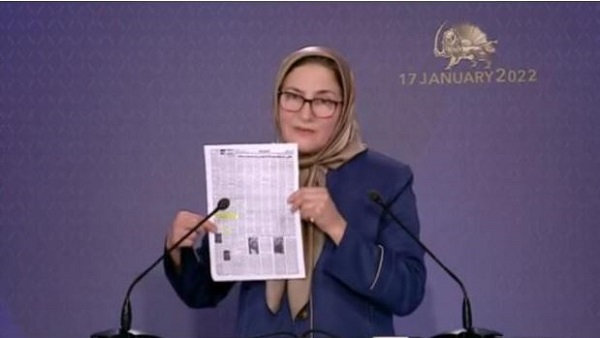
My mother, father, and two brothers were executed by the regime. What was their crime? Supporting the Mojahedin, distributing their newspaper, donating money to their cause, and treating their wounded.
In prison, the Revolutionary Guards (IRGC) tried to force my mother and father to interview and disseminate lies against the People’s Mojahedin Organization of Iran (PMOI/MEK). But they refused. They decided to sacrifice their lives to achieve freedom for the Iranian people.
I was arrested at the age of 19. I spent many months in solitary confinement. During my time in prison, I was witness to torture and executions. I was able to escape prison miraculously and joined the MEK in Ashraf.
The liberation of Iran is more at hand today than ever. It is the duty of the Iranian people to change the regime and establish democracy. But they also expect the international community, and especially European Union countries, to be on their side in their struggle instead of pursuing fruitless negotiations with the regime.
Azadeh Alamian
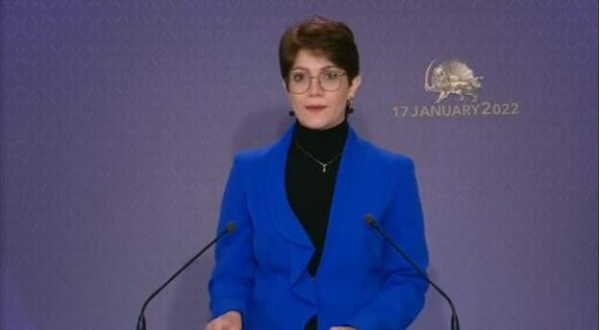
I spent time in prison in Iran when I was three years old, and I was with my grandmother. Her sons and daughter were executed in prison. I was arrested again when I was six years old along with my mother. In prison, I saw blindfolded prisoners who were severely beaten and their bodies full of wounds.
I went through very hard times seeing such scenes when I was only six years old. People across the world must know what happened to the people of Iran. They should know the stories of the Iranian Resistance members who accepted death but did not submit to the dictators ruling Iran.
Guy Verhofstadt, MEP, and Former Prime Minister of Belgium
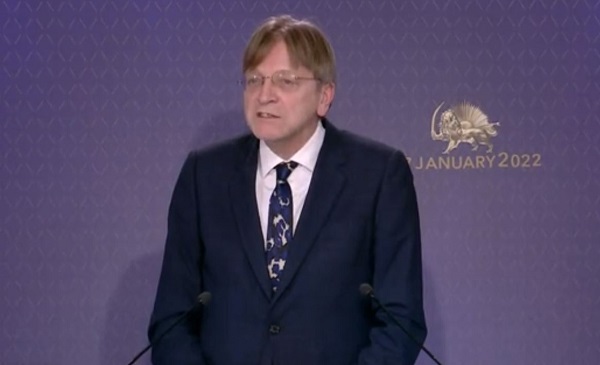
A climate of impunity exists today in Iran. We have to continue to denounce the systematic impunity of the regime in Iran and to defend the enormous courage of the defenders of human rights and also those who are doing that in difficult circumstances in exile. Because I think it’s our common duty to denounce violations of democracy, violations of human rights everywhere in the world. And it is our duty to undo injustice and end the suffering of people who stand up for democracy and fundamental freedoms.
The uprising of the thirsty residents in the southern province of Khuzestan, who took to the streets against the water shortage, or a simple request of concerned men and women to tackle the pandemic. The authorities’ response remains unchanged. They strike back. They don’t solve the problem. Citizens who advocate the right to access water, to advocate the right for good health or better living standards were arrested and are now serving time behind bars. The impunity crisis in Iran reached a peak last year in June, when another major event in Iran attracted worldwide attention. This was the appointment of Raisi as the president of the regime. We all know that Raisi is one of the main perpetrators of the 1988 mass murder of more than 30,000 political prisoners. But instead of being tried and convicted of crimes against humanity, he was promoted to the position of president of Iran. And I think that his appointment is a stark reminder that impunity is rampant in Iran.
Crimes against humanity can never go unpunished. We are all still shocked, in fact, by the genocide that took place in the summer of 1988 in Iran. It was of an unprecedented horror and scale, as up to 30,000 innocent men and women died a terrible death only because they were striving for a free and a prosperous Iran. And as long as the guilty are not brought to justice, are not punished, it must, it is our duty to take every opportunity to express our outrage at the atrocities and the lack of justice.
In 1988, the international community massively turned a blind eye on the killings, despite repeated calls from the Iranian Resistance for a proper investigation. This passivity continues to this day. As long as we remain blind to the terrible crimes committed by that regime, we remain also blind to the endless grief of the affected families and the many Iranian citizens who are living in exile.
And drawing up an official report on the horrific events of 1988 is also of a major importance for those who suffered and who survived, because only when justice is done, then they will finally find peace also. It is high time for the United Nations to launch an official inquiry, as not launching such an inquiry also creates a dangerous precedent to the atrocities and continued gross violations of human rights not only in Iran, but with respect to all authoritarian regimes where human rights are trampled, as authorities think that they get away with it in the long run.
Failure to investigate the atrocities of 1988 by the international community gives the regime a green light to continue its brutal practices against its own population. It is not only a question of the past. It’s mainly a question of what is happening today and what will happen in the future in Iran, and of why this investigation is needed. In fact, the detention, torture, killing of union delegates, of environmentalists, of lawyers, of children rights activists, has reached frightening proportions since Raisi came to power.
People are bullied, or locked up, receive outrageous and ridiculous punishments because they peacefully raised their voices for a free and a fair Iran. The United Nations special rapporteur on human rights in Iran also expressed his concerns on the increase of violence and terrifying number of executions, especially in 2021. It’s time to give these acts of aggression against the people of Iran the highest priority now in the international community. And that is why we should put Iran and the fight against impunity high on the political agenda. And instead of being silent witnesses of the deteriorating state of Iran, it is of the utmost importance to shape our strategy and foreign policy with Iran by putting our concerns about human rights violations at the forefront. The well-being of the people of Iran shall be a red line. We are talking about red lines every day in international politics. Well, this is a red line at all times, in bilateral talks and in negotiations. And I think that this firm policy, this red line should also concern the nuclear deal with Iran. Then ongoing talks on the denuclearisation of Iran cannot be a simple smokescreen not to tackle the human rights issue in Iran.
Therefore, it’s absolutely crucial to open in these talks a specific chapter on the human rights situation, as well as the rule of law and the lack of democracy in Iran.
The situation of human rights and its defenders in Iran is critical. It’s worse than it has ever been over the last 40 years. Conditions in prisons are more and more disgraceful. Justice is completely nonexistent and as a result of intensified repression. Anyone who stands up for his fellow citizens risks being tortured and killed. Urgent international action is needed to turn change this situation. And for that, I reiterate the need to make progress for an official and a profound report on the killings of 1988 as it all started there. Finally, investigating the massacre of ’88 and holding the guilty responsible will open the way for all Iranian people to design a new future for their beloved country. And in my quest for an official investigation under the auspices of the United Nations, I will continue to urge Josep Borrell, our high representative of the European Union for Foreign Affairs and Security Policy, to take the necessary steps to obtain it.
So please allow me, please allow me also to say a few words, especially to you, to the tireless work done by the Iranian people in exile, because I know that leaving your hearts and relatives in a country one left behind to continue to struggle for a better Iran deserves more than our appreciation. I can imagine that the conditions in which you, as a victim of repression, continue your mission are often precarious. There is always the risk that your relatives who stayed behind can be physically attacked or can be silenced because of your commitment. But it is thanks to the people in exile that’s important to tell you that we have a clear window, also a clear view on what is really happening in Iran today. Thank you very much.
John Bercow—Speaker of the UK House of Commons, 2009-2019
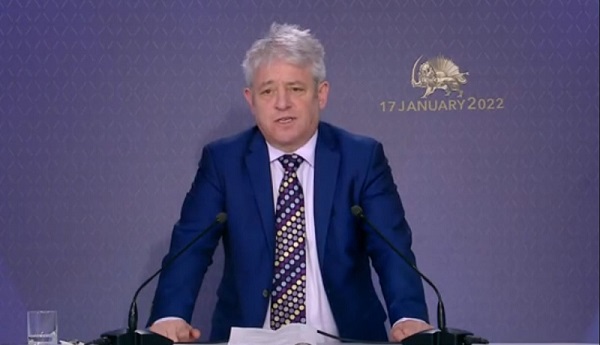
Madam President, Mrs. Rajavi, it is truly a privilege to be invited to be amongst you today. It is an outstanding display of sacrifice that you and others are making and you do so because of an inextinguishable belief that you have right on your side and that your cause needs to be championed not just principally for your own personal sakes, but for the liberation of the people whom you hold dear.
I remember from my own experience over two decades in the House of Commons as a member and indeed from my decade long tenure as speaker, the ubiquitous presence of the National Council of Resistance of Iran in and around Westminster. So it is a cause of which I’ve long been conscious.
The cacophony of international revulsion at and condemnation of the Shah because there was much anger about that regime. But what I so quickly discovered was the one bestial and unaccountable regime can be succeeded by another bestial and unaccountable regime.
I’m thrilled to be here to highlight your cause, to acknowledge the suffering of the people of Iran and to join forces with others in seeking to be as best I can, a voice for freedom.
A key slogan of yours is down with the oppressor, be it the Shah’s dictatorship or that of the Supreme Leader. In the most voluble terms I can back your calls for a secular and democratic republic; And indeed, Mrs. Rajavi, if I may, to support what I regard as your ten-point plan for the country’s future: people’s sovereignty, universal suffrage, pluralism, that is to say, the opportunity of democratic and political competition; freedom of speech, freedom of parties; freedom of the internet, individual and social freedoms in accordance with the UN Declaration of Human Rights; a separation of religion and state is crucial; complete gender equality; an independent judiciary and legal system; autonomy for the Iranian nationalities who shouldn’t have to submit to some sort of centralized yoke but should be entitled to express themselves; equal opportunities in employment and entrepreneurship, and protection of the environment; crucially, a peaceful non-nuclear Iran co-existing with others around the world and cooperating with them.
But you can’t erase or ignore the past. In order to plan the future, you’ve got to recognize what’s happened. And that’s why I agree with Amnesty that the 1988 massacre must be investigated. We have to get to the bottom of the full, grisly horrors of it, and Ebrahim Raisi must be investigated for crimes against humanity. The man is a disgrace to Iran. I can’t help but feel that although it is common for abusive regimes to deploy a foreign minister, a diplomatic sort of figure, to try to mitigate the perceived excesses of his regime, reformers and hardliners don’t seem to me to have much to choose between them when the president signed thousands of death warrants. “Reformers, hardliners, the game is over.” Your tactics are exposed and around the world the regime is known as a state sponsor of terrorism and for its egregious abuse of human rights.
The nuclear issue has been focused on to a degree already. All the evidence so far is that the conciliatory approach hasn’t brokered any notable advance. The regime now is at its weakest position. It faces serious crises at home, and this is a point at which to be firm and to send a clear message to the regime that if they do not abandon their nuclear weapons program, the suspended U.N. resolutions will again be applied. That is the language that a totalitarian regime understands. It doesn’t respect conciliation. It respects and even sometimes fears strength. It is utterly derisive towards and contemptuous of weakness.
On human rights, since the start of this year, three women aged 59, 62 and 69 were sentenced to 12 years in prison in total for supporting the People’s Mojahedin Organization of Iran (PMOI/MEK). Two were sentenced to five years and another to two years. This was in November of last year, following days of sit-ins and large scale protests. The regime’s security forces attacked the farmers and local residents of this farm because those people were demanding their rights.
There are examples galore. 357 people executed in 2021 markedly more, more than 100 greater than in 2020. But Hassan Rouhani ended his eight year term with nearly 5000 executions, including a very significant number of political prisoners.
On the 1988 massacre, the regime might not like it being mentioned, which is a good reason to keep mentioning it over and over and over again. We are talking about mass crimes against humanity and seven UN experts put it in a letter published just over a year ago. The failure of international bodies to act has had a devastating impact on the survivors and families, as well as on the general situation of human rights in Iran. It has emboldened Iran to continue to conceal the fate of the victims and to maintain a strategy of deflection and denial that continues to date.
The relentless quest for freedom in Iran continues on a magnificent scale. Protests by workers in their thousands, protests by teachers and educators. Protests by retired people, farmers, ranchers, nurses, businesspeople, truck drivers, chicken farmers, taxi drivers, engineers, flood victims, prisoners and others. A common characteristic of these protests is people clashing with the regime’s security forces. The presence of women and children in uprisings has been significant. A significant number of these protests have been organized with calls on social media and the opportunity.
Last year’s election and the nationwide boycott thereof were very revealing. The election was a sham. It was an absolutely, infinitesimally small turnout. And the regime even was embarrassed by it. The boycott showed that people reject the sham differentiation between moderate and hardliner, and it was a blow to Khamenei and the regime. We must never forget Raisi was a key player in the death commissions which massacred so many people. So I want to repeat this notion that “No to the Shah, no to religious dictatorship, no to theocracy and yes to democracy.”
You have friends. You have allies. You have cheerleaders all over the planet. You have people who, irrespective of race, of color, of creed, of gender, of disability or of orientation will want to fly the flag of freedom in Iran and to ensure that the flame of freedom burns brightly, and that it must never be extinguished.
We will get there in the end. I’m very lucky to have been invited to speak to you. Thank you very much indeed.
Fredrik Reinfeldt—Former Prime Minister of Sweden
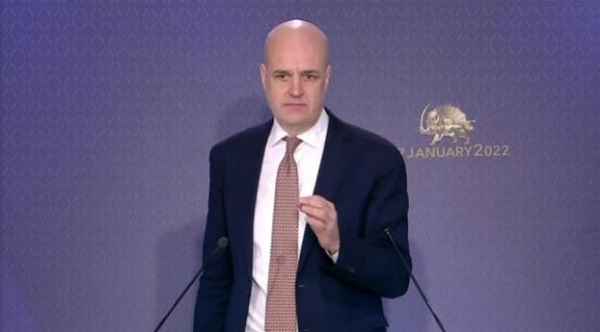
President Rajavi and friends of a free, democratic and secular Iran, this is a very important meeting. I would like to thank the witnesses that we were listening to earlier. These witnesses tell us about the family members that we have lost, so we must remember, you must remember, and the world outside must learn about this.
When we say democracy, we mean something more than just counting votes. With democracy, we mean freedom of speech, freedom of the press, the right to assemble and to campaign. If you don’t follow all these rules, it’s not a democracy. It’s actually more of an appointment of a few rather than someone who has been elected by the people. So, Raisi is not supported by the Iranian people. He is chosen among a few men who thought that’s the one we want to have to keep control. That’s something completely different and should not be regarded as an elected official that can be respected alongside those who have won open free elections around the world.
People in Iran want food and freedom. They don’t want nuclear weapons. No one has ever asked for nuclear weapons. It’s the idea of a few because they cannot rely on the support of the people in winning free elections. They need the nuclear heads to stay in power and be secure because otherwise they could come under pressure, and therefore lose their influence. That’s why they want the bomb, nothing else.
If you want the international community to react more sharply to what is happening in Iran, you need Europe to join together to stand up for the values of democracy and in doing so, using all powers, except for military, to push back authoritarian rule wherever you will see it.
And one of the toughest cases, the most important, will be the mullahs of Iran because they are a threat to their people, to their country. They are a threat to the region, and they are a threat to the world for their destabilizing activities, for misusing Islam, and for wanting to have nuclear weapons. That is what we need to do. Thank you very much.
Franco Frattini— Foreign minister of Italy (in 2002–2004 and 2008–2011) and once European Commissioner for Justice, Freedom and Security (2004–2008)
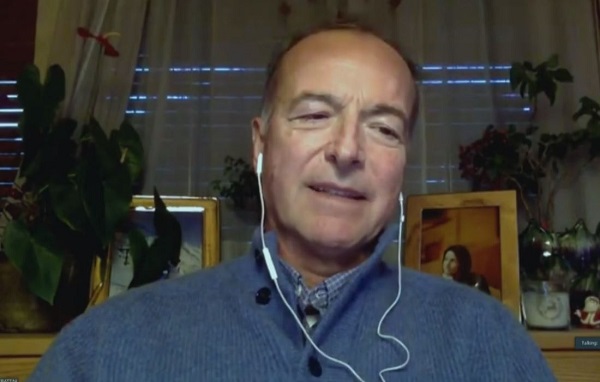
Thank you very much, Madam President. I will stress three points and I will make a suggestion. First of all, I pay tribute to those who have lost their lives for a free and democratic Iran. We have been listening to some of the witnesses. But unfortunately those who lost their lives are not here, but we have every day, every minute to pay a strong tribute to their memory, to their courage, to their determination to build a democratic Iran. Those who have been fighting for a free and democratic Iran are the good believers. They are the good Muslims. They respect their religion. The religious tyranny does not respect religion because they incite or directly commit mass killings. It is my moral duty to pay tribute to those who have been so brave to put at risk their lives and the life of their relatives, their brothers, their fathers, and so on.
I remember very well when people used to say there is some differences between reformists and conservatives. This is absolutely not true. I remember when in 2003 I, as Italian foreign minister, along others were starting to negotiate with the regime about nuclear proliferation. There were so-called reformists, Khatami and Foreign Minister Kharrazi. If I compare those leaders at that time, these are exactly the same people as today. I don’t see any difference. They just wanted to get something more as a trade off, to be free to continue abuses at the expense of their people. They are always the same. They have only one preoccupation, which is to follow the orders of the Supreme Leader. The Supreme Leader is one person who installs the president and who has the ultimate say in Iran. The point is that we have to dismiss the optimism of some who seek a better leadership. There is no better leadership. There is only the same policy to continue with oppression and abuses.
Some also claim we have to lift sanctions because the sanctions are affecting innocent people and their daily lives. This is absolutely not true. More money is spent on the nuclear program than paying for the expenses of ordinary people. No money is distributed to ordinary people or to improve the quality of life of Iranians. So support the idea of being stricter, not weaker, when dealing with sanctions for violation of international rules by the regime of Iran. No complacency. We have to recognize that every additional dollar will be spent by improving and strengthening the military and nuclear apparatus against the people in the squares, in the streets, and to increase the nuclear capacity to dominate, to intimidate not only the people of Iran while they protest – and the protests have increased compared to the past – but also to try to dominate the region, thus contributing greatly to the destabilization of the whole Middle East.
Think about terrorism. Think about destabilization. If we don’t care about such real problems which emerge from places that are far from us, sooner or later they will come to our homeland. It is demonstrated by the terrorist attacks committed by the people sent by the Iranian regime to kill innocent people in the territory of Europe. If we ignore what they are doing, sooner or later, they will come to kill in our neighborhood. This is why it is so important to be very firm. The prevention of increasing power and capacity of this bloody regime is not only a moral duty, it also serves the protection and promotion of universal rights. Universal rights should be a part of our policy. It corresponds also to our practical interest. If we ignore that, the regime will grow stronger. They will organize to kill and to affect our countries.
My second point concerns human rights. I’m a judge by career. I’m just being appointed as the president of the Italian Supreme Court. So in that capacity, I can understand how to prevent and how to react to this kind of massive violations. These violations correspond undoubtedly to massive crimes against humanity.
Those crimes have to be punished without time limits. This is the point that justifies and imposes our common action. We are not talking about demands of 30 years ago. We are talking about the duty of punishing crimes that cannot disappear. Those crimes have to be punished independently, and regardless of the passage of time, because otherwise it would be too easy for a ruthless dictatorship to try to cover up the evidence to try to hide behind the argument of passage of time. This is absolutely not possible.
There are three steps here. First, there must be a real political will to counteract these kind of actions that will permanently be disgraced. We see some who advocate a terrible theory, which says we have to negotiate and persuade the Iranian regime to give up killing or torturing or imprisoning political opponents. This is absolutely stupid. You cannot imagine that a regime like the Iranian regime can be persuaded. They are preserving their power through violence and other abuses. We have to exercise more political strength and more political goodwill, but also by resorting to international legal elements, meaning using the free and independent international investigations carried out by United Nations. We have in the European continent a quite important instrument, which is the Council of Europe. The Council of Europe relies on the European Convention on Human Rights.
The Council of Europe is frequently opening investigations. Since we are talking about a council made up of many more countries than simply the European Union member states countries, we could have more leverage to put pressure or at least to raise awareness in countries that still don’t understand or want to ignore this terrible situation of Iran. The people of Iran, those who you represent every day, cannot be alone. We should send a message that this regime has to go and is close to the end. This regime cannot use its power to kill its people instead of improving the quality of life of these people.
And my final point is the following. In my current role as a judge and particularly in the Supreme Court, I think we have to work to create an international jurisdiction, maybe by strengthening the role of the International Criminal Court. I understand there are serious legal problems, but we have to try to overcome politically these legal problems in order to have a universal binding jurisdiction with respect to the violation of non-negotiable human rights. We recognize the enormous efforts of you, of the resistance of the communities of Iranians abroad. But we have to be aware that if we don’t find a concrete way to punish, to stop, to isolate this blood-thirsty regime, it will take a longer time than we would like. Thank you very much.
Paria Kohandel
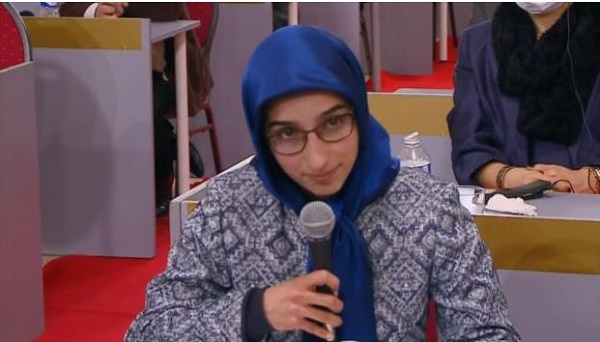
People of my generation are taking to the streets despite the threats of being arrested and tortured and executed and despite the coronavirus pandemic.
Ali Fatemi
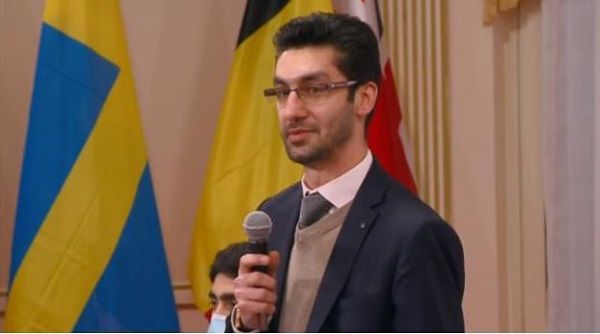
I escaped Iran during the 2009 protests. Many of my friends were executed. Under the mullahs’ rule, Iran has been defined by executions, which continue to this day. One of those responsible for the 1988 massacre is Ebrahim Raisi, who is now the so-called president of Iran. He is illiterate. He has been in the judiciary system for many decades.
At the same time, there is a worldwide movement under the leadership of Madam Rajavi, inside Iran and across the globe people support it. On behalf of Iranian youth inside Iran and abroad, I thank you for supporting the Iranian Resistance and ask you to condemn this regime and support this movement.

